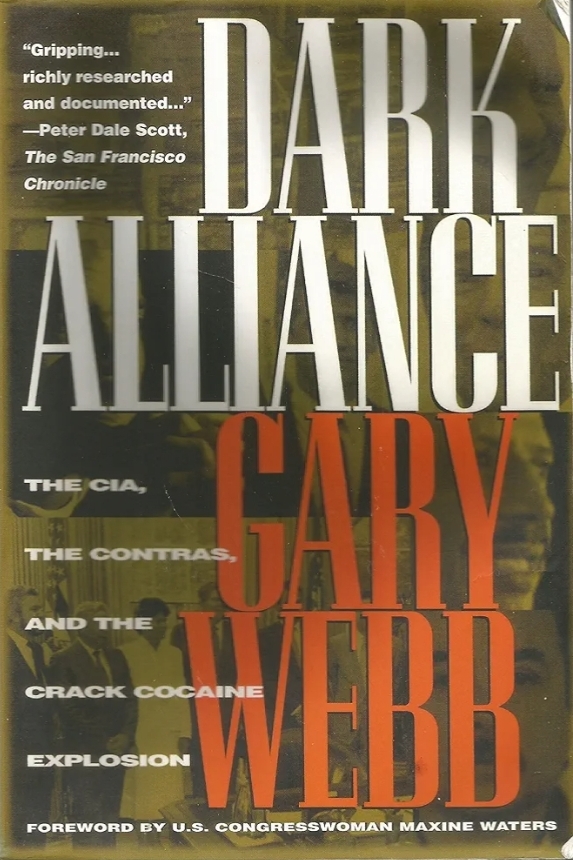“Dark Alliance: The CIA, the Contras, and the Crack Cocaine Explosion” is an investigative book by journalist Gary Webb, originally based on his 1996 three-part newspaper series for the San Jose Mercury News. The book explores the links between the U.S. Central Intelligence Agency (CIA), the Nicaraguan Contra rebels, and the rise of the crack cocaine epidemic in American cities during the 1980s and 1990s. Webb’s work sparked significant controversy and debate due to its allegations that the CIA either turned a blind eye to or directly facilitated the importation of cocaine into the United States to fund the Contra war against Nicaragua’s Sandinista government.
Key Themes and Arguments:
- Link Between the CIA, the Contras, and the Drug Trade:
- Webb’s central argument is that the CIA was complicit in drug trafficking operations that led to the crack cocaine epidemic in the United States. He details how the Nicaraguan Contras, a U.S.-backed rebel group fighting the Sandinista government, were funded by profits from cocaine sales, some of which were facilitated or ignored by the CIA.
- Webb investigates how two Nicaraguan drug traffickers, Norwin Meneses and Oscar Danilo Blandón, funneled large amounts of cocaine into Los Angeles, selling it to drug dealers, including “Freeway” Rick Ross, a key figure in the rise of the crack epidemic.
- The Role of “Freeway” Rick Ross:
- Webb highlights the role of “Freeway” Rick Ross, a notorious drug dealer in Los Angeles who became a central figure in the spread of crack cocaine. Ross was supplied with large quantities of cocaine by Blandón and Meneses, which he then converted into crack and sold at affordable prices throughout Los Angeles and beyond.
- Ross’s business flourished due to the cheap and abundant supply of cocaine, and Webb argues that this was a direct result of the CIA’s involvement or negligence. Ross was reportedly unaware of the political implications of his suppliers’ activities but became a key figure in Webb’s investigation.
- The Contras and Drug Trafficking:
- Webb discusses how the Contras, financially supported by the Reagan administration, were struggling to maintain funding after the U.S. Congress passed the Boland Amendment, which restricted U.S. government support for the Contras. In response, the Contras and their supporters, including CIA operatives, allegedly turned to drug trafficking to raise money for their activities.
- Webb provides evidence that senior Contra leaders, with the knowledge and, at times, assistance of the CIA, became involved in the drug trade. He argues that the U.S. government knew about these activities but allowed them to continue to maintain support for the Contras.
- Impact on the African-American Community:
- Webb’s book highlights the devastating impact of the crack cocaine epidemic on African-American communities in the United States, particularly in Los Angeles, where the drug trade was concentrated. The crack epidemic led to a surge in addiction, crime, and incarceration, disproportionately affecting poor and minority neighborhoods.
- Webb argues that the government’s involvement in the drug trade and the subsequent failure to address the epidemic effectively represent a profound injustice against African-American communities. He discusses how the spread of crack cocaine exacerbated systemic inequalities, with communities already marginalized by poverty and racial discrimination being hardest hit.
- Government Response and Media Backlash:
- After the publication of Webb’s series, the San Jose Mercury News faced immense backlash from mainstream media outlets, including the New York Times, Washington Post, and Los Angeles Times. These outlets criticized Webb’s work, arguing that his evidence was circumstantial and his conclusions were exaggerated.
- The CIA and other U.S. government entities also denied the allegations. Under intense pressure, the Mercury News initially defended Webb’s reporting but later distanced itself from the story, eventually leading to Webb’s resignation. The backlash damaged Webb’s career, and he faced significant personal and professional challenges.
- Official Investigations and Findings:
- Webb’s work prompted several investigations by the CIA, the Department of Justice, and Congress. The CIA’s Inspector General report, released in two volumes in 1998, admitted that the CIA had contacts with drug traffickers and that it did not report all of its knowledge of Contra drug trafficking to Congress, but it denied direct involvement in or endorsement of drug trafficking activities.
- The Department of Justice’s report also acknowledged that individuals associated with the Contras were involved in drug trafficking and that U.S. law enforcement officials were aware of this. However, the report concluded that there was insufficient evidence to support the claim that the CIA directly facilitated the drug trade.
- The CIA’s Knowledge and Negligence:
- Webb argues that even if the CIA did not directly facilitate the drug trade, it was still complicit through negligence and lack of oversight. The agency failed to take action against known drug traffickers within the Contra ranks and, in some cases, obstructed investigations by U.S. law enforcement agencies.
- Webb suggests that the CIA’s primary concern was maintaining support for the Contras against the Sandinistas, regardless of the methods used. The agency was willing to overlook or downplay illegal activities, including drug trafficking, if they served the broader geopolitical goal of defeating communism in Central America.
Specific Examples and Evidence:
- Blandón and Meneses’ Drug Operations: Webb documents how Blandón and Meneses, former Nicaraguan government officials turned Contra supporters, became significant cocaine suppliers in the United States. Blandón admitted in court that he sold cocaine in the U.S. and funneled the profits to the Contras, often with the knowledge of U.S. officials.
- CIA’s Connections to Drug Traffickers: Webb presents multiple instances where CIA operatives were aware of or in contact with drug traffickers. For example, a 1984 letter from the U.S. Drug Enforcement Administration (DEA) detailed Blandón’s trafficking activities but noted that he was protected from prosecution because of his Contra connections.
- Impact on Los Angeles and Beyond: Webb outlines how the cocaine supplied by Blandón and Meneses was sold in Los Angeles, giving rise to the crack epidemic that spread across the country. This directly contributed to a public health crisis, crime wave, and mass incarceration, particularly within African-American communities.
Controversy and Criticism:
- Media and Institutional Pushback: Webb’s reporting was criticized by major media organizations, which argued that he lacked conclusive evidence and relied too heavily on circumstantial links. They claimed that Webb’s conclusions overstated the CIA’s involvement and that he failed to provide definitive proof of direct agency complicity.
- Professional Fallout for Webb: The controversy surrounding the publication led to Webb’s ostracization within the journalistic community, culminating in his resignation from the Mercury News. Webb faced significant personal and professional hardship and was ultimately found dead in 2004 in what was ruled a suicide.
Legacy and Impact:
- Vindication and Reassessment: In later years, many aspects of Webb’s reporting were vindicated by independent investigations and official admissions. The CIA’s 1998 Inspector General report acknowledged many of the key claims made by Webb, particularly the agency’s failure to act against Contra-linked drug traffickers and its reluctance to fully disclose the extent of its knowledge.
- Cultural and Social Impact: “Dark Alliance” continues to be a seminal work on the intersections of drug policy, race, and government accountability. It has sparked broader discussions about the war on drugs, systemic racism, and government transparency. Webb’s reporting has influenced public understanding of the crack epidemic and remains a reference point in discussions about media ethics and investigative journalism.
“Dark Alliance: The CIA, the Contras, and the Crack Cocaine Explosion” by Gary Webb is a provocative and meticulously researched book that sheds light on the complex and often hidden connections between U.S. foreign policy, the war on drugs, and social justice issues. Despite the controversy it generated, Webb’s work remains a critical piece of investigative journalism that challenges readers to consider the consequences of covert government actions and the importance of accountability and transparency.





